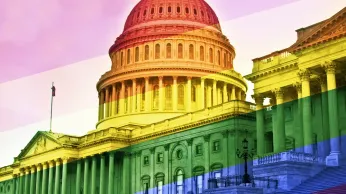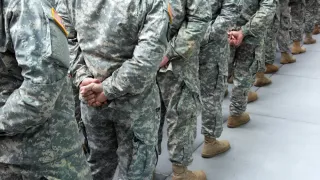
10 hours ago
Is Marriage Equality Really Safe? Queer Voices Respond to Trump Adviser’s “No Worries” Claim
READ TIME: 4 MIN.
If you’re queer, trans, or anywhere on the rainbow spectrum, chances are you’ve heard it before: “Don’t worry, marriage equality is settled law.” This week, David Urban—a Republican strategist, former Trump campaign adviser, and CNN commentator—doubled down on that line in a USA Today column, accusing Democrats of “sowing fear and discontent” about the potential overturn of Obergefell v. Hodges, the landmark Supreme Court decision that made same-sex marriage legal nationwide .
Urban’s message is simple: “Marriage equality isn’t in danger. Were that to change, Americans on the left, center and right would come to its defense.” He says Democrats are just hyping threats to raise money and keep people “angry, divided and distrustful.” But for LGBTQ+ folks watching the political winds shift and Supreme Court justices flex their reversal muscles, that message lands with more than a little shade—and a hefty dose of skepticism.
Urban’s op-ed leans heavily on polling, citing a survey from Centerline America showing that 72% of Americans support same-sex marriage when pushed to choose, with 55% of Republicans approving the Respect for Marriage Act . He points out that even Donald Trump, the Republican party’s perennial headline-maker, has acknowledged same-sex unions as valid, and the GOP’s 2024 platform has dropped language opposing marriage equality .
But before popping the champagne, let’s check the receipts. Gallup polling from earlier this year paints a different picture: Republican support for same-sex marriage is not only a minority position but one that’s been declining over the past several years . And while some Republican lawmakers once championed marriage equality, many—including U.S. Rep. Nancy Mace—have ditched those principles when politically expedient .
It gets stickier: Several GOP-led legislatures have actively passed resolutions urging the Supreme Court to overturn Obergefell . Meanwhile, legal challenges like Kim Davis’s petition—seeking to end the constitutional protection of same-sex marriage—are making their way to the Supreme Court, fueling real anxiety and speculation within LGBTQ+ circles .
Urban’s column takes aim at Hillary Clinton’s remarks on the "Raging Moderates" podcast, where she warned: “Anybody in a committed relationship out there in the LGBTQ community, you ought to consider getting married, because I don’t think they’ll undo existing marriages, but I fear they will undo the national right.”
For many queer Americans, Clinton’s caution isn’t just political theater—it’s practical advice. The Supreme Court’s reversal of Roe v. Wade in 2022 set a precedent for overturning long-held rights based on shifting judicial philosophies and “history and tradition” tests, as legal experts have noted . The fear isn’t fantasy—it’s rooted in a court that has shown it’s comfortable upending precedent, especially when conservative majorities prevail.
For LGBTQ+ couples, families, and individuals, Clinton’s warning is a call to action—not simply to tie the knot but to stay vigilant, organized, and ready to defend hard-won rights.
Urban’s assertion that “most Republicans have lost the appetite to challenge marriage rights” may be comforting, but it glosses over the complexities of queer life in America . For the 32 states where same-sex marriage bans are still technically on the books, overturning Obergefell would mean those laws snap back into place overnight . For transgender people and nonbinary folks, marriage equality is closely tied to recognition of gender and family rights, which remain under constant legislative threat.
And let’s be real: The lived experience of LGBTQ+ Americans includes watching politicians who claim to be “pro-equality” pivot on a dime when the wind changes. The recent trend of anti-LGBTQ+ bills in statehouses, the targeting of trans youth, and the rise of far-right rhetoric all fuel anxiety—not because Democrats are “working overtime,” but because queer and trans people have learned that legal protections are often fragile, and vigilance is survival.
In LGBTQ+ culture, marriage equality is more than a legal right—it’s a symbol of belonging, dignity, and love that’s been hard-fought for generations. The queer community knows the difference between real progress and political lip service, and has always understood that “settled law” can be unsettled overnight.
The emotional resonance here is palpable: When a Trump adviser tells queer America to “stop worrying,” it’s not just dismissive—it’s an attempt to control the narrative and minimize the stakes. But queer joy, resilience, and activism have always thrived in the face of uncertainty. Whether it’s rallying in the streets, organizing online, or simply loving out loud, LGBTQ+ people refuse to be gaslit into silence or indifference.
As one queer commentator put it, “If you keep telling us the sky is falling, eventually people will stop listening.” But if you keep telling us to calm down while the ground shifts beneath our feet, don’t be surprised when we get louder, prouder, and more determined to defend every inch of progress .
So, is marriage equality “safe”? The answer depends on who you ask—and how closely you’re watching the courts, the polls, and the political maneuvering. For LGBTQ+ folks, it’s not just about maintaining legal rights, but about sustaining a movement that refuses to let anyone else define what’s “real,” “settled,” or “safe.”
The politics of fear are real—but so is the politics of hope. As queer Americans continue to fight for their families, their futures, and their love stories, one thing is clear: No adviser, platform, or poll will ever tell us when it’s time to stop caring.






